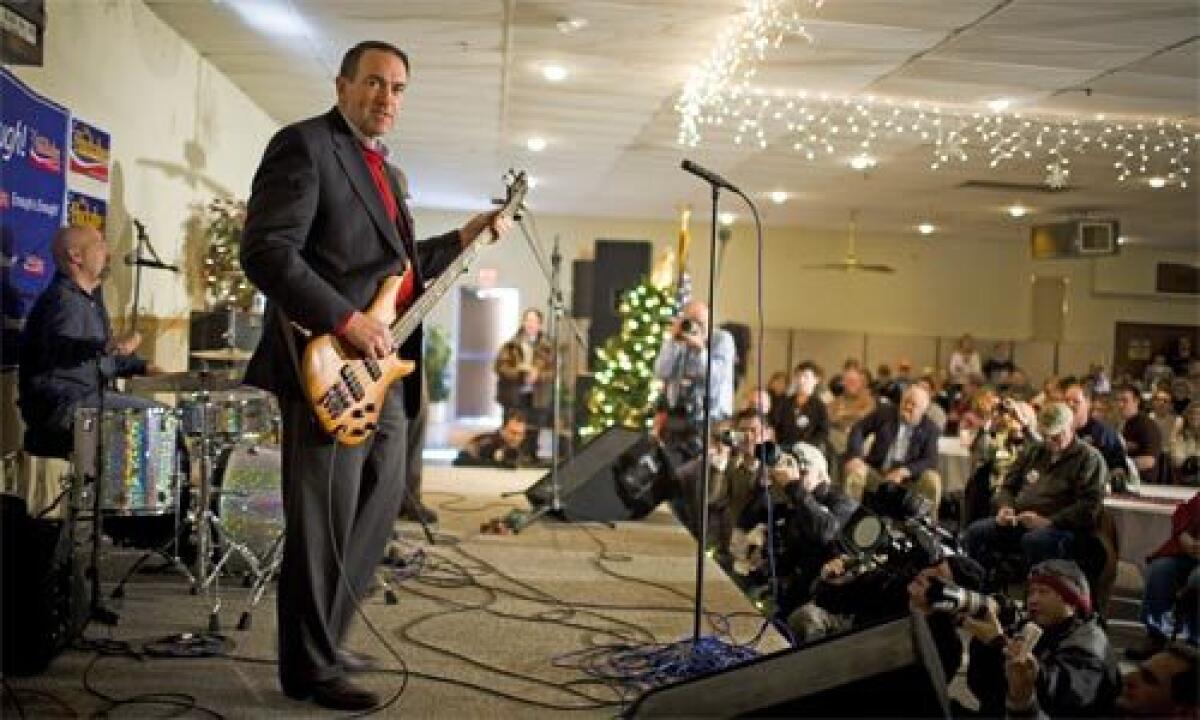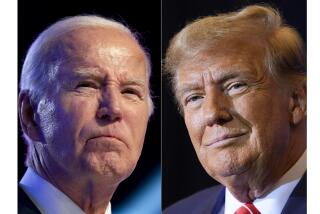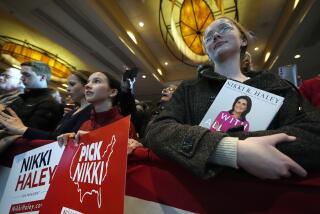GOP base scatters to rival camps

- Share via
DES MOINES — The long-standing coalition of social, economic and national security conservatives that elevated the Republican Party to political dominance has become so splintered by the presidential primary campaign that some party leaders fear a protracted nomination fight that could hobble the eventual nominee.
Former Massachusetts Gov. Mitt Romney aspires to build a conservative coalition in the mold of Ronald Reagan, but his past support of abortion rights gives many social conservatives pause. Mike Huckabee, a Southern Baptist minister, is a purist on social issues but has angered economic conservatives because he raised taxes while he was governor of Arkansas.
Former New York Mayor Rudolph W. Giuliani and Sen. John McCain of Arizona have tough-guy images and hawkish records, but many Republicans are wary of them because of their immigration and other policies.
The breach within the party was evident here Tuesday, two days before Iowa holds the first nominating contests of the presidential race, as Huckabee and Romney each sought to show he could reach across the conservative spectrum and unite Republicans, as did Reagan and George W. Bush in prior elections.
Huckabee, responding to attacks on his credentials as a fiscal conservative, unveiled a new television ad saying that as Arkansas governor he had signed the state’s first broad-based tax cut in 160 years.
Romney, who has tried to persuade voters that his business background makes him best suited to handle the economy, sought to shore up his image among social conservatives by talking about his support of family values. Campaigning with the youngest of his five grown sons, Craig, Romney visited homes in several communities and told the invited guests that Americans were patriotic, God-fearing people who wanted “leaders who will tell us the truth.”
The contrasts in their appeals -- the businessman targeting the Christian right, the former preacher targeting the fiscal conservatives -- starkly illustrated how the Republican Party’s core constituencies have scattered among rival camps. The net effect has been a fractured field with no clear front-runner.
Recent polls show Huckabee and Romney in a tight race in Iowa but Huckabee trailing badly in New Hampshire, where McCain has been Romney’s chief rival. Nationally, Giuliani remains among the top draws but is no longer the clear front-runner. Former Sen. Fred Thompson of Tennessee, who at one point was doing well in national surveys, now draws diminished support.
“None of our candidates seem to have caught on,” said GOP pollster Neil Newhouse. “You have the whack-a-mole Republican primary: As soon as one rises up, the others knock them down.”
That instability has fueled fears that if a winner does not quickly emerge in a primary calendar loaded with contests in January and early February, a prolonged primary fight could delay the GOP’s focus on election day in a campaign in which Democratic voters already have contributed more money and, according to several polls, expressed greater satisfaction with their choice of presidential contenders.
“I’m concerned the Democrats will settle on their nominee fairly soon and Republicans will take longer beating each other up,” said Whit Ayres, a Republican pollster. “It gives another advantage to the Democrats in a year in which they already enjoy significant advantages.”
History is not on the side of a party that takes a long time to winnow its field to one candidate. In almost every presidential campaign over the last generation, the party that settled on its nominee first won the general election, said Rhodes Cook, an expert on presidential campaigns.
“If the nominating process is going on for a while, it shows the nominee is having some problem pulling his base together,” Cook said. “That does not bode well for the general election.”
For Republicans, the party’s coalition of business interests, religious conservatives and defense hawks has been its foundation since Reagan captured the GOP nod in 1980. Bush also rode that coalition to power 20 years later, harnessing the fundraising power of business to the grass-roots energy of social conservative activists.
Republicans remain hopeful that, once their nominee is chosen, the coalition will reassemble behind him -- as it did in 1988, when Bush’s father had to contend with primary challenges from evangelical leader Pat Robertson, propelled by social conservatives, and former Rep. Jack Kemp (R-N.Y.), the darling of the party’s supply-side-economics wing.
But the 2008 nominee may face a stiff challenge in bridging the fault lines that the fractured Republican field have exposed. For many GOP voters, some of the candidates are simply unacceptable.
The recent Times/Bloomberg poll in Iowa found that 38% of the Republicans who had chosen a candidate to back said they had no second choice. And though 61% of Iowa Democrats surveyed said they could support any of their party’s nominees, 42% of Republicans expressed that view about their choices.
Many antiabortion activists resolutely oppose Giuliani because he supports abortion rights. McCain is poison to many religious conservatives who have not forgotten that he called Robertson and the Rev. Jerry Falwell “agents of intolerance” during his 2000 campaign.
“I will support the Republican Party except for one man -- John McCain,” said Chuck Taylor, a retired truck driver in Iowa who responded to The Times poll. “He has sided too much with the liberals.”
Huckabee, anathema to many economic conservatives because of the tax hikes he signed as governor, has been peppered with attacks from the anti-tax Club for Growth.
Romney has hit Huckabee over the same issue, as well as for breaking from the Republican establishment in other ways. On Tuesday, he attacked Huckabee over a published comment apparently made in jest that President Bush did not read the annual National Intelligence Estimate “for four years.”
Romney swung hard at the political equivalent of a hanging curve ball.
“This is not a time to be mocking our president, and it was, I think, in bad taste,” Romney said in Johnston, a Des Moines suburb. “I think that we should come together and recognize the great work our president is doing and not take our rhetoric or our plays from the Democratic playbook.”
Huckabee responded to attacks on his credentials as a fiscal conservative with a new television ad saying that as Arkansas governor he had signed the state’s first broad-based tax cut in 160 years.
He also released a new ad underscoring his opposition to abortion rights.
The two former governors also continued to draw on Huckabee’s unusual news conference Monday.
Before a roomful of reporters and TV cameras, Huckabee announced that he would not air an advertisement he had just produced attacking Romney, but then showed the ad to the assembled news media.
The move raised questions about whether Huckabee was attempting to lead reporters to carry negative messages about Romney in a way that allowed him to assert that he was running a positive campaign.
Huckabee did not mention Romney by name during his midday appearances Tuesday but appeared with a banner that read, “Enough Is Enough,” which was the title of the ad he had canceled.
Huckabee found himself on the defensive with reporters who questioned whether his continued use of the slogan was disingenuous.
“It’s still valid,” Huckabee said. “Enough is enough of the negative campaigning. . . . The Tonya Harding school of politics has to stop.”
Romney sought to keep the issue alive.
“It does remind you a bit of a person who stands up and says, ‘I’m not going to call my opponent any names, but here are the names I’d call him if I were going to call him names,’ ” Romney said. “What he did yesterday didn’t fool the media, and I don’t think it will fool the people of Iowa either.”
The splintering in the GOP field has occurred in part because voters have come to believe that the leading candidates each have a different strength, the Times/Bloomberg poll found, with no one candidate dominating on a wide range of leadership qualities.
Romney was seen in the poll as best equipped to handle economic issues. Huckabee was strong on social issues in Iowa -- but not in New Hampshire, where the moderate wing of the party is stronger. McCain is seen as the best equipped to handle foreign affairs.
Among Democrats, by contrast, a single candidate -- Hillary Rodham Clinton -- dominated in all those policy areas, the poll found.
Ken Khachigian, a California-based GOP political strategist, sees the intraparty fragmentation as a reflection, in part, of modern politics’ tendency to focus on narrow constituencies rather than big-picture themes the way Reagan did.
“He understood the poetry of politics,” Khachigian said. “That’s the big difference this year -- we are losing the poetry for narrowcasting.”
Khachigian and other Republicans argue that in the end, Clinton may prove the great unifier of the GOP. If she wins the Democratic nomination, they say, Republicans of all stripes will rally in their shared loathing of her.
“Hillary, for Republicans, is the gift that keeps on giving,” said Dirk Van Dongen, a business lobbyist who supports Giuliani.
But an effort built around beating Clinton would not amount to the kind of grand, idea-driven campaign that conservatives aspire to, Newhouse said. “That would be for winning an election, not for maintaining a governing majority.”
Times staff writers Joe Mathews and Scott Martelle contributed to this report.
More to Read
Sign up for Essential California
The most important California stories and recommendations in your inbox every morning.
You may occasionally receive promotional content from the Los Angeles Times.















